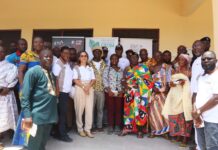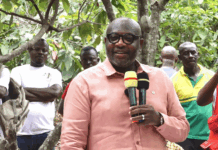The Minister of Food and Agriculture, Dr. Owusu Afriyie Akoto, has said, Ghana’s US$2.5billion annual earnings from cocoa commodity is abysmally low, even though the global market worth over US$100billion.
This, he said, calls for the need to increase domestic value-addition to enable the country, which is the second-largest global producer of cocoa, to maximise its gains from world cocoa trade.
Dr. Akoto told this to leaders in the cocoa industry from Ghana and its neighbour Cote d’Ivoire during a one-day Cocoa Investor Forum that brought together key players in the industry from both countries as well as some key global institutions.
Ghana and Cote d’Ivoire produce more than 60 percent of total global output of cocoa annually, with Ghana receiving at least US$2.5billion into its economy from the industry every year.
The cocoa industry provides about 1.6 million jobs across the value chain, but global price fluctuations create difficult situations for the two countries which have remained raw-beans exporters.
Ghana and Cote d’Ivoire, last year, established joint cooperation on cocoa with the aim of seeking to influence the direction of global stakeholders’ decisions on the commodity; especially those which affect its pricing, as the two countries account for more than 60 percent of total global output annually.
Dr. Akoto explained that increased domestic consumption would spur increased cocoa processing locally and provide the opportunity to industrialise and diversify their economies, create jobs and generate revenues for social and economic development.

“The enhancement of cocoa farmers’ welfare requires an improvement in farm productivity, sustainable domestic and international prices, and a stronger producer organisation to ensure that the interest of farmers and producer countries are catered for while fostering a competitive domestic downstream sector,” he stated.
Dr. Akoto said increasing domestic value addition is long overdue, adding that expanding the downstream sector and increasing consumption of cocoa domestically are among the urgent steps that need to be taken.
He explained that improvements in the welfare of farmers across both countries will require improvement in farm produce, sustainable domestic and global prices, among others.
Senior Minister, Yaw Osafo-Maafo urged the governments of Ghana and Cote d’ Ivoire to take steps to influence world cocoa prices – just like members of the Organisation of Petroleum Exporting Countries (OPEC) do regularly in the oil industry.
He said: “The two countries should certainly have influence on cocoa prices globally; we should have an OPEC-type set up in the cocoa industry”.
There should be a strategy that can control quantities on the market at a given time – because for every commodity in the world, when there is too much of the product on the market, the price falls; when there is scarcity, the price goes up,” he said.
“So, between Ghana and Cote d’ Ivoire, we should strategise such that even the flow in the market is somehow controlled by us in some way. It is very difficult because of the economy. You need the money. So, we are always in a hurry to put the beans on the market; but sometimes by doing so we are hurting ourselves.
“Now, we are all talking about improving production. But the flipside is when cocoa production goes up the price falls, but you need to also improve the production. So, it is now up to us to strategise the release of this commodity on the market; we are in this boat together. We either float or sink,” he stated.






